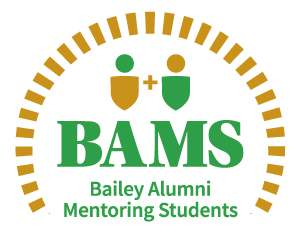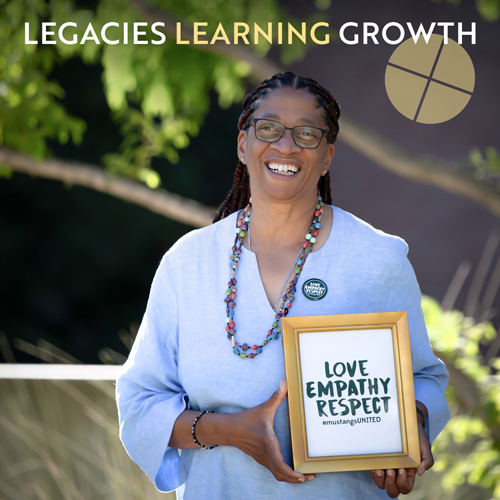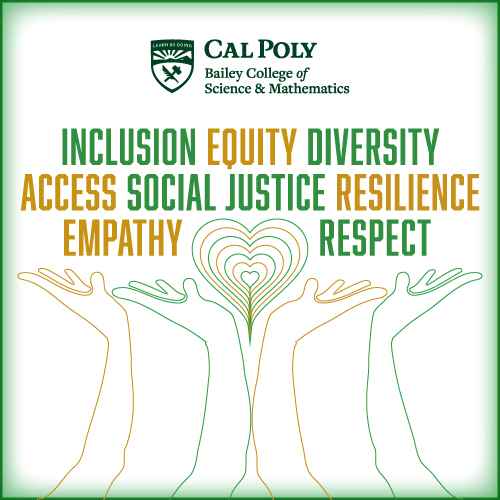Increasing Opportunities
 Long lines at Starbucks are not the problem for many first generation and underrepresented students. Eating, paying tuition, navigating an unfamiliar college landscape, and finding a sense of belonging are much higher on the list. Universitywide, only 67 percent of underrepresented students will graduate in six years, as compared to 81 percent of white students.
Long lines at Starbucks are not the problem for many first generation and underrepresented students. Eating, paying tuition, navigating an unfamiliar college landscape, and finding a sense of belonging are much higher on the list. Universitywide, only 67 percent of underrepresented students will graduate in six years, as compared to 81 percent of white students.
The university has made it a priority to close the graduation gap and increase enrollment and retention of underrepresented students. For those who tap into the services the university offers and find a place on campus, their Learn by Doing experiences at Cal Poly and their degrees open up worlds their parents could only dream of. Meet two young women in the College of Science & Mathematics who have done just that.
Ana Maria Nunez Castrejon
You might mistake Ana Maria Nunez Castrejon’s quiet demeanor for reticence. It would be a big mistake. The biological sciences senior is better described as tenacious.

Ana Castrejon works in a Cal Poly lab. For the last year
and a half, she has held an on-campus research position.
Photo // Tenney Rizzo
Only the second in her family to attend college, Castrejon swam somewhat blindly into the stream of college admissions. “I knew that college was something I needed to do, but I wasn't entirely sure what it was. I just knew you get good grades and do volunteer work and then they let you in. I didn't know about financial aid, loans or anything like that,” she said.
Castrejon grew up in Bakersfield, Calif., where her sister attended CSU Bakersfield while living with their parents. Choosing Cal Poly meant Castrejon was the first to move away from home, not a small decision for a Latina woman from an immigrant family and not one that worked well at the beginning.
“I felt like I didn't belong here,” Castrejon said. “In one class, a student said in her speech that if you made a certain amount of money, you wouldn't be able to support your family, and I was thinking, ‘My dad makes a lot less than that, and I’m sitting here.’”
Following her freshman year, Castrejon considered transferring to CSU Bakersfield, but her older sister, who inspired her to pursue biology, also inspired her to stay at Cal Poly. “My sister didn't have the opportunity to go anywhere else,” Castrejon said. “I didn't want to throw away all the opportunities that she didn’t have.”
Fortunately, during her second year, Castrejon found the Louis Stokes Alliance for Minority Participation (LSAMP), a National Science Foundation-funded program that aims to increase the graduation rates of students from underrepresented groups in STEM disciplines. Through LSAMP, she found programs that supported her academically and people who understood what life felt like for her on the Cal Poly campus.

Ana Castrejon poses in front of the Mustang statue near the
Administration Building. Photo // Tenney Rizzo
During the summer of her sophomore year, Castrejon applied for and was awarded a spot in the Costa Rica CSU LSAMP research program. She received a travel reimbursement and a stipend to study rainforest plants and parasites on deep ocean fish. It was only the second time she’d been outside of California.
“I couldn’t believe I got it at first. I thought it was a mistake,” Castrejon said. “My parents were really afraid. I had to keep reassuring them that it was through the university.”
Following the experience in Costa Rica, Castrejon presented her research at the Society Advancing Chicano/Hispanics & Native Americans in Science conference in Los Angeles, which solidified her confidence in her scientific abilities. She never looked back, seeking out an on-campus research position where Castrejon has worked for the last year-and-a-half.
“Ana has actively sought out Learn by Doing experiences that broaden her horizons while allowing her to delve more deeply into specific topics she’s passionate about,” said Biology Professor Sandi Clement, Castrejon’s research advisor. “This summer, Ana performed a set of technically challenging cell and molecular biology experiments more typically performed by advanced graduate students than by undergrads.”
“I’ve grown. I have a lot more confidence in myself. I didn't know much about college, and now I’m thinking about the possibility of grad school,” Castrejon said. “I’ve earned my spot, and I’m just as capable as anyone.”

Margaret Audi
A native of Kenya, Margaret Audi lived in Botswana and the U.K. before her family settled in Riverside when she was 10 years old. Audi felt at home wherever she landed — until she arrived at Cal Poly.
“In our dorm, only two out of 80 students were black. I felt like there was a microscope, and everyone would know what I did,” said Audi, a senior kinesiology major.

Margaret Audi gives a presentation inside of a classroom.
Photo // Tenney Rizzo
When Audi smiles, the whole room lights up, and she exudes a confidence that belies the difficulties she’s felt as a minority student on campus and in the larger San Luis Obispo community.
“Every time I go downtown, I always get asked, ‘Where are you from? Is this your first time in SLO?’ They never assume I’m a student,” Audi said. “So I don't like going downtown that often.”
Audi spent one quarter of her junior year at CSU Long Beach while she considered leaving Cal Poly. The strength of the kinesiology major and Cal Poly’s Learn by Doing approach drew her back. “The Learn by Doing model is why I came here, and I really appreciate it,” she said.
The love of learning that brought Audi back to Cal Poly also led her to get deeply involved in the campus and San Luis Obispo communities despite the social difficulties. She added an ethnic studies minor; researched the health of underrepresented students with Kinesiology Professor Heather Starnes; and took an internship with the City of San Luis Obispo, working on the city’s action plan.
“Being involved and aware of your surroundings is really important because it helps you to shape and form public opinion. Knowledge is power,” Audi said. “It's important not to be self-absorbed and to be more self-aware.”
Following her own advice, Audi took the rare step of trying to improve the campus culture for underrepresented students who come after her, specifically in the area of group projects. During group work, Audi often found that her fellow students disregarded her opinions. Not one to let an unfair situation persist, she decided to do what she could to change the situation.
She conducted a workshop with LSAMP students and asked them about their experiences working in groups. She solicited suggestions from the students on how professors could change group dynamics in the classroom. Audi will distil the information she collected into an information sheet to be distributed to faculty members through the Center for Teaching & Learning.

Margaret Audi takes a break from working on a
presentation inside of the Kinesiology Department
computer lab. Photo // Tenney Rizzo
“When I think of Margaret as a role model for the future of Cal Poly and the broader workforce, it is her commitment to integrating her knowledge about social justice with her STEM major that is truly exemplary,” said Jane Lehr, chair of the Women’s & Gender Studies Department and director of LSAMP. “Margaret truly exemplifies the idea that Learn by Doing can simultaneously provide a strong professional foundation and address equity and access — we do not need to choose between these options.”
Audi credits her mother, a nurse, as the source of her passion for helping others and the MultiCultural Center and Intervarsity Christian Fellowship as her stalwart support centers on campus. She hopes to get her doctorate in kinesiology, and through LSAMP, is applying to the Bridges to Doctorate Program, which provides financial aid for a master’s program as a prelude to a doctorate.
“Cal Poly has really shaped me into the person I am today. The good and bad experiences have made me a stronger person,” Audi said. And then, in her typically thoughtful way, she showed us all the way forward: “Because people have not been empathetic toward me, it forces me to be empathetic toward others. My experience of not being understood has helped me try to understand others.”





